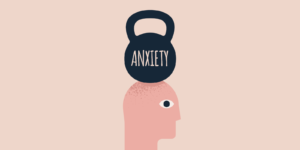Anxiety is a common and natural response to stress, but when it becomes overwhelming and uncontrollable, it can have a debilitating impact on one’s life. Acute anxiety, often referred to as a panic attack or an anxiety attack, is an intense episode of anxiety characterized by sudden and severe symptoms. Fortunately, there are various effective treatments and strategies available to help individuals manage and alleviate acute anxiety. In this blog, we will explore the causes and symptoms of acute anxiety, as well as the treatment options and coping mechanisms that can provide relief.
Contents
Introduction to Acute Anxiety

Acute anxiety, often referred to as a panic attack or acute anxiety episode, is a sudden and intense episode of anxiety that can be extremely distressing and overwhelming. It is a normal response to stress or perceived threats, but in some cases, it can become disruptive and impair daily functioning. Understanding acute anxiety involves recognizing its symptoms, causes, and potential treatment options.
Symptoms of Acute Anxiety:
- Intense Fear: Individuals experiencing acute anxiety often feel an overwhelming sense of fear or impending doom, even when there is no immediate threat.
- Physical Symptoms: Panic attacks can lead to a range of physical symptoms, including rapid heart rate, chest pain, shortness of breath, sweating, trembling, and dizziness.
- Psychological Symptoms: Acute anxiety can also manifest as psychological symptoms such as a feeling of unreality (depersonalization), fear of losing control, and an intense need to escape the situation (agoraphobia).
- Cognitive Distortions: During an acute anxiety episode, individuals may experience distorted thinking patterns, including catastrophic thinking and irrational fears.
- Behavioral Changes: People with acute anxiety may avoid situations or places that they associate with anxiety, leading to social isolation or disruptions in daily life.
Causes of Acute Anxiety:
- Stressful Events: Acute anxiety often arises in response to highly stressful situations, such as a traumatic event, a major life change, or a particularly challenging circumstance.
- Genetics: There can be a genetic predisposition to anxiety disorders, making some individuals more susceptible to acute anxiety.
- Neurochemical Factors: Imbalances in brain chemicals, such as serotonin and norepinephrine, can contribute to the development of anxiety disorders.
- Environmental Factors: Childhood experiences, environmental stressors, and learned behaviors can also play a role in the development of acute anxiety.
The Importance of Early Intervention
Early intervention is crucial in various fields, including healthcare, education, and mental health, as it can significantly impact outcomes and improve the well-being of individuals. When it comes to mental health issues like anxiety, depression, and other disorders, early intervention is of paramount importance for several reasons:
- Preventing Escalation: Mental health problems often start with mild symptoms that can escalate over time if left untreated. Early intervention can prevent these issues from becoming more severe, debilitating, or chronic.
- Improved Outcomes: Addressing mental health concerns early can lead to better treatment outcomes. It allows individuals to learn coping strategies, develop healthy habits, and gain insight into their condition before it worsens.
- Reducing Suffering: Early intervention helps individuals avoid unnecessary suffering. Mental health issues can be distressing and affect one’s daily life, relationships, and overall well-being. Getting help sooner can alleviate this suffering.
- Enhanced Functionality: By addressing mental health challenges early, individuals can maintain or regain their ability to function effectively in their personal, academic, and professional lives.
- Lower Healthcare Costs: Preventing the progression of mental health issues can lead to cost savings in the long run. Treating severe mental health conditions often requires more extensive and costly interventions.
- Reducing Stigma: Early intervention helps reduce the stigma associated with mental health. When individuals seek help early, it sends a message that mental health is a valid concern and that seeking support is a sign of strength, not weakness.
- Supporting Resilience: Early intervention can equip individuals with the skills and resources to build resilience, which helps them better navigate future stressors and challenges.
Treatment Options for Acute Anxiety

Treatment options for acute anxiety, also known as panic attacks or acute anxiety episodes, aim to provide immediate relief during an episode and to address the underlying causes and long-term management of anxiety. Here are some effective treatment options:
Medication
In some cases, healthcare providers may prescribe medication to manage acute anxiety symptoms, especially if they are severe or recurrent. Commonly prescribed medications include:
- Benzodiazepines: These are fast-acting drugs that provide rapid relief from acute anxiety symptoms. However, they are typically used for short-term management due to the risk of dependency.
- Selective Serotonin Reuptake Inhibitors (SSRIs) and Serotonin-Norepinephrine Reuptake Inhibitors (SNRIs): These antidepressants are often prescribed for long-term management of anxiety disorders.
- Beta-Blockers: These medications can help control physical symptoms of anxiety, such as rapid heart rate and trembling.
Psychotherapy
Psychotherapy, also known as talk therapy or counseling, is a therapeutic approach that involves trained mental health professionals helping individuals, couples, families, or groups address emotional and psychological issues, improve mental health, and develop coping strategies. Also, Psychotherapy is a collaborative process that aims to promote personal growth, enhance well-being, and alleviate distress. Here are some key aspects of psychotherapy:
1. Therapeutic Relationship: Psychotherapy is built on a trusting and confidential relationship between the therapist and the client. This relationship provides a safe and supportive space for open and honest communication.
2. Goals and Objectives: Therapists and clients work together to establish clear goals and objectives for therapy. These goals may involve reducing symptoms, improving relationships, gaining insight into one’s thoughts and behaviors, or developing specific coping skills.
3. Evidence-Based Approaches: There are various approaches to psychotherapy, each with its own techniques and theoretical frameworks. Some common evidence-based psychotherapy approaches include:
- Cognitive-behavioral therapy (CBT): Focuses on identifying and changing negative thought patterns and behaviors.
- Psychodynamic Therapy: Explores unconscious thoughts, emotions, and early life experiences to gain insight into current difficulties.
- Humanistic Therapy: Emphasizes personal growth, self-acceptance, and the pursuit of individual potential.
- Interpersonal Therapy (IPT): Concentrates on improving interpersonal relationships and communication.
- Dialectical Behavior Therapy (DBT): Combines cognitive-behavioral techniques with mindfulness to manage intense emotions and improve emotional regulation.
- Family Therapy: Addresses family dynamics and relationships to improve communication and resolve conflicts.
- Group Therapy: Involves multiple participants working together in a supportive group setting, often with a specific focus.
Lifestyle Changes
Lifestyle changes play a significant role in promoting physical and mental well-being, preventing health issues, and enhancing overall quality of life. These changes involve adopting healthier habits and making positive adjustments to various aspects of daily life. Here are some key areas where lifestyle changes can have a positive impact:
1. Diet and Nutrition:
- Healthy Eating: Embrace a balanced diet rich in fruits, vegetables, whole grains, lean proteins, and healthy fats. Limit the consumption of processed foods, sugary snacks, and excessive amounts of caffeine or alcohol.
- Portion Control: Pay attention to portion sizes to avoid overeating.
- Hydration: Stay adequately hydrated by drinking plenty of water throughout the day.
2. Regular Physical Activity:
- Incorporate regular exercise into your routine. Aim for at least 150 minutes of moderate-intensity aerobic activity or 75 minutes of vigorous-intensity activity per week, along with muscle-strengthening exercises on two or more days per week.
3. Sleep Hygiene:
- Prioritize getting enough sleep (typically 7-9 hours for adults) by establishing a consistent sleep schedule, creating a comfortable sleep environment, and avoiding excessive screen time before bedtime.
4. Stress Management:
- Practice stress reduction techniques such as mindfulness meditation, deep breathing exercises, yoga, progressive muscle relaxation, or journaling.
- Set realistic goals and prioritize tasks to reduce feelings of overwhelm.
5. Social Connections:
- Nurture and maintain meaningful relationships with friends and family. Social support is crucial for mental well-being.
- Seek out social activities or groups that align with your interests and values.
Seeking Professional Help

Seeking professional help is a crucial step in addressing various physical, mental, emotional, or behavioral issues. Whether you’re dealing with a mental health concern, a medical condition, a relationship problem, or any other issue affecting your well-being, professionals with the right expertise can provide guidance, support, and effective treatments. Here are some key considerations and steps to take when seeking professional help:
1. Recognize the Need for Help:
- Acknowledge that you may benefit from professional assistance. Common signs include persistent distress, difficulty functioning in daily life, and a sense that you’re unable to manage your concerns on your own.
2. Determine the Type of Help You Need: Consider the nature of your issue to determine the appropriate type of professional help. For example:
- For mental health concerns (e.g., anxiety, depression, PTSD), consider seeing a therapist, psychologist, or psychiatrist.
- For medical issues, consult with a healthcare provider or specialist.
- For relationship or family problems, consider couples or family therapy.
- For addiction issues, seek help from addiction counselors or support groups.
- For legal concerns, consult with an attorney.
- For career or educational guidance, consider career counselors or academic advisors.
3. Research Professionals:
- Find qualified professionals who specialize in your specific area of need. Look for licensed and credentialed individuals or organizations with a good reputation.
4. Seek Referrals:
- Ask for recommendations from trusted sources, such as friends, family members, healthcare providers, or support groups. They can provide valuable insights into finding the right professional.
5. Contact and Interview Professionals:
- Reach out to potential professionals to discuss your concerns, treatment options, and their approach to addressing your issues. Ask questions about their qualifications and experience.
Conclusion
Acute anxiety may feel overwhelming, but it is a treatable condition. By understanding its causes, recognizing the symptoms, and exploring various Acute anxiety treatment options, you can regain control of your life. Remember, seeking help and implementing coping strategies are vital steps towards a brighter and anxiety-free future.
If you are experiencing anxiety related issues, Online Anxiety Counseling at TherapyMantra can help: Book a trial Online therapy session.


